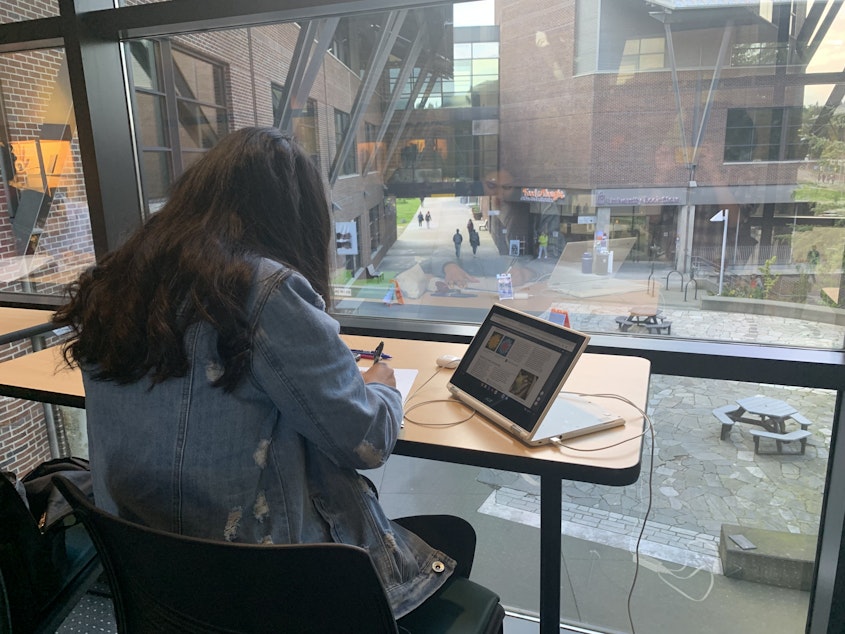'I think I can still save her.' How one immigrant teen supports her mother and sister

Teenagers have really busy lives. School, sports, clubs, jobs and more. When you're the oldest child in an immigrant family, there can be even more pressure to succeed.
Maria is one of these teens. She found the burden to be almost too much.
Editor's note: To protect Maria's privacy, we are only using her first name.
Maria is one of my best friends. She's a high school senior who always has a Red Bull in her hand, especially when she's rushing from work to school on two hours of sleep.
Things got especially hard when her relative in Mexico was dying, and Maria witnessed her mom struggling even more.
"As a child," Maria told me, "all you see is your mother crying over a phone. You see your mother distancing herself, becoming stressed [over] where's the money, and her feeling so incredibly powerless."
Maria's mom wanted to help the family she left behind in Mexico, but she had to stay and take care of her children. This made Maria feel like a burden.
Sponsored
To help out, Maria stepped into a new role as a second mother to her little sister. She was twelve-years-old.
"I was the one cooking my meals," she said. "I was the one taking care of us. A twelve-year-old child doesn't know how to cook a balanced meal. You cook chicken nuggets and french fries because that's easy. Because you're hungry. But that's not gonna fuel your body."
When Maria turned sixteen, she felt obligated to work so that she could help support her family. Now at eighteen, she's still tired after a full night of sleep.
The sacrifices she has made for her family have taken a toll, especially when it comes to taking care of her sister.
"At the time, I felt it was fine," Maria said. "Obviously in the long run, it probably wasn't the healthiest thing. I essentially didn't get to feel the relief of being a child."
Sponsored
Even when she has down time, Maria still struggles to find a relief because she's "so mentally checked out."
"I'd rather waste my time," she said, "lying in bed, staring at the ceiling, watching Netflix, having my eyes glaze into a corner, pretending to read my textbook."
As a first generation immigrant, she feels the need to seem successful, so she has learned to hide it all.
"I'm not saying that all the smiles were fake," she said, "but it was, a lot of times, a mask when I was trying to navigate through a dark time. I mentally, emotionally, physically want to give up because I don't see my way out."
"It's like digging your own grave without people knowing it."
Sponsored
She's willing to sacrifice her well-being so her sister doesn't have to. "She's like my child," she said. "I look at her, and I think, I could still save her."
It's not just for her sister though. Maria is also doing it for herself. "I'm going to graduate high school," she told me. "I'm going to do it. It's gonna be for me. It's gonna be for my family. It'll be all worth it."
Now she has decided to take some small steps forward, starting with relying more on her friends. Some of them urge her to get more help, but knowing herself and how self-reliant she is, she knows it's going to take some more time.
"I can't necessarily be like, 'Okay, let's fix me! Let's put everything on the table,'" she said. "That's not how it's gonna work for me."
She's also letting her friends know how they can help. "The people around you," she said, "all they can really do sometimes when people aren't willing to open up is to check in on them. Be there to listen."
Sponsored
Maria is learning how to open up more too. It's tough, but she knows it will help her, her sister, and her whole family in the long run.
This story was created in KUOW's RadioActive Advanced Producers Workshop for teenagers, with production support from Mary Heisey. Edited by Liz Jones. Find RadioActive on Facebook, Twitter and Instagram, and on the RadioActive podcast.
Support for KUOW's RadioActive comes from the Bill & Melinda Gates Foundation Discovery Center.



